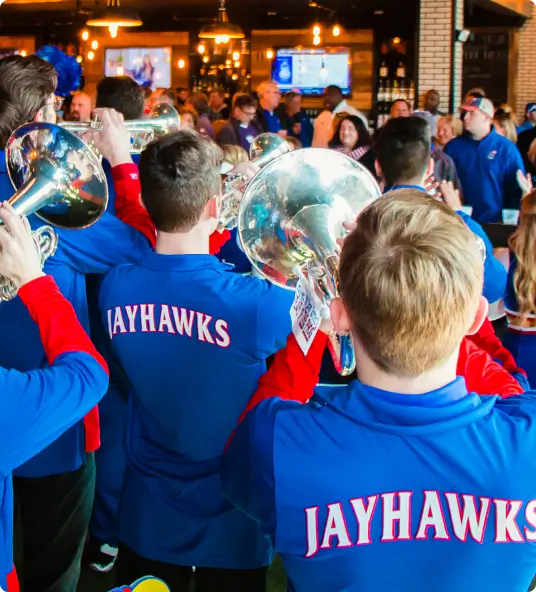Jayhawks in leadership positions are everywhere you look, including through the Jayhawk Career Network. KU Alumni, in partnership with SumnerOne, is highlighting Jayhawk leaders who are models for others in their industries with our “Copy the Leader” program.
What do you do in your work?
I serve as the Vice President of Sales and Marketing at the KU Alumni Association. Essentially, I lead the teams at our organization that oversee business development and sponsorships, marketing and content strategy, and membership. I have the great privilege of working with an incredible group of people who work every day to identify strategies, goals, and tactics that help us connect with alumni in meaningful ways. We strive to generate funds that power programs like the Jayhawk Career Network, Jayhawk Business Directory, Student Alumni Network, and so much more.
What are the qualities of a good leader?
A good leader has to listen to their teams and be vulnerable enough with themselves and others to acknowledge that they don’t have all the answers and can’t achieve success alone. Listening, in turn, helps great leaders build consensus, identify organizational or departmental goals and opportunities for growth, and help people take advantage of said opportunities to succeed and develop. Jim Collins talks about great leaders getting the right people in the right seats on the right bus in order to achieve phenomenal results. I’ve always found that insightful. A leader must focus on helping their people achieve their very best.
Great leaders also acknowledge their shortcomings and imperfections. We all make mistakes or find ourselves at a loss. Those moments are opportunities for reflection and growth.
How do you practice leadership at your job?
I try to exhibit the qualities that I expect in my own leaders. I try to listen, create space for people to pursue their own dreams and goals, establish accountability, and lead with honesty and transparency. I think we often assume that being a leader means you have all the right answers as soon as a question is asked. I don’t think that’s true. Instead, I try to admit when I don’t have the answer. Then, I get smart people in a room to ask questions and guide conversations that uncover the answers.
Leadership is also deeply human, and I think it is important that we create space for human connections and conversations. I like to take coffee walks around our office and stop to chat with people. Ask about their weekend, upcoming vacations, or things that excite them. Leadership is relational and relationships take time. So, we should invest time just like we do for all other aspects of our work.
What makes a team or group successful?
Great teams and groups have a high level of trust, accountability, and shared expectations. When you trust each other, you can have difficult, uncomfortable conversations that make us stronger. When trust is lacking, teams tend to gloss over conflict or necessary changes to operations or strategy, which causes more damage in the long-term.

What makes a team or group successful?
Great teams and groups have a high level of trust, accountability, and shared expectations. When you trust each other, you can have difficult, uncomfortable conversations that make us stronger. When trust is lacking, teams tend to gloss over conflict or necessary changes to operations or strategy, which causes more damage in the long-term.
How can leaders in your industry help their organizations adapt to change?
Our industry is going through a tremendous amount of change at a pace that can be difficult to keep up with. This means that we have to become experts at change management and focus our energy on helping our teams exhibit adaptability and resilience.
I read a leadership book once that used Lewis and Clark as an example of severe adaptability. They believed that they would find a waterway from the east coast to the west coast and brought canoes as the primary mode of transportation for their journey. Imagine their surprise as the Rocky Mountains began to appear on the horizon. In this era of constant change, we often find ourselves at the base of a mountain with nothing but a canoe. Leaders have to work with their teams to adapt and advance in order to summit the peak and continue the journey.
Want to receive alumni and career stories like this in your inbox? Subscribe to the Water Cooler, a monthly career newsletter for alumni, students and friends. It includes upcoming events, featured mentors, stories about alumni and students, jobs and more.




